We may not have the course you’re looking for. If you enquire or give us a call on + 1-866 272 8822 and speak to our training experts, we may still be able to help with your training requirements.
We ensure quality, budget-alignment, and timely delivery by our expert instructors.
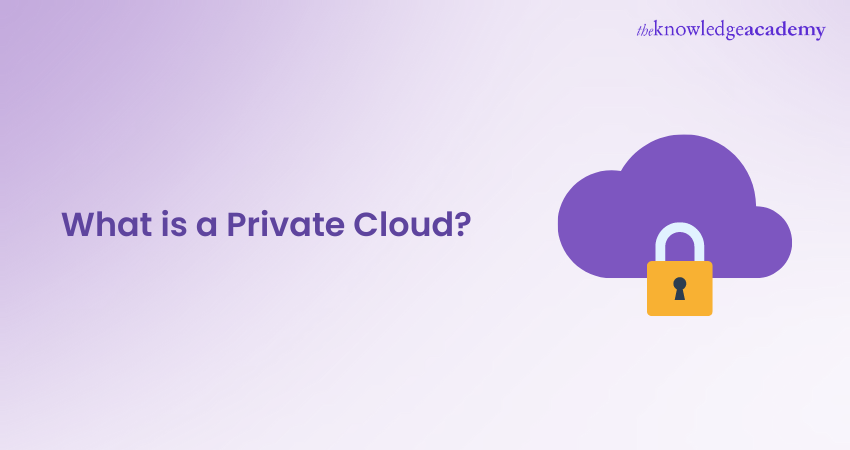
Imagine a cloud that rains down digital innovation and leaves everyone awash with unprecedented online connectivity! That's what Cloud Technology brings to the modern age. Cloud Computing continues to revolutionise industries by enabling the delivery of computing services over the internet. Among its many essential aspects is the concept of Private Cloud. Any business owner striving to elevate its services and security elements needs to know What is a Private Cloud.
Unlike public clouds, which are shared and hosted by third-party providers, a Private Cloud is a Cloud Computing environment tailored to a single organisation. According to Statista, as of 2024, 38% technical professionals utilised Private Cloud solutions such as Microsoft Azure Stack and VMware vSphere/vCentre, which underscores the importance of this technology. This blog provides a comprehensive understanding of What is a Private Cloud and how organisations rely on its many benefits. Let's dive in!
Table of Contents
1) What is a Private Cloud?
2) Private Cloud vs Public Cloud vs Hybrid Cloud Solutions
3) How Does a Private Cloud Work?
4) Private Cloud Architecture
5) Benefits of Private Cloud
6) What are the Types of Private Cloud Solutions?
7) Conclusion
What is a Private Cloud?
A Private Cloud is a form of Cloud Computing where the infrastructure is exclusively dedicated to one user organisation. This Private Cloud can be in the organisation's own data centre, at a third-party colocation facility, or provided by a Private Cloud provider who offers hosting services for Private Clouds, potentially alongside traditional public shared cloud resources.
Typically, the user organisation operates the Private Cloud as it would manage a traditional on-premises infrastructure, including ongoing maintenance, upgrades, operating system patches, handling middleware, and managing application software. Private Cloud solutions give organisations greater control and enhanced security over their dedicated cloud servers, but they demand higher IT expertise than using a public cloud.
Many companies choose private Cloud services because they provide an easier way to meet their regulatory compliance requirements. Some choose Private Cloud services because their workloads involve confidential documents, Personally Identifiable Information (PII), intellectual property, financial data, medical records, or various other sensitive data.
Private Cloud vs. Public Cloud vs. Hybrid Cloud Solutions
When you choose a cloud deployment model, you have three categories at your disposal: Public, Private, and Hybrid Cloud. Here’s a table outlining the biggest differences between Public Cloud, Hybrid Cloud, and Private Cloud:
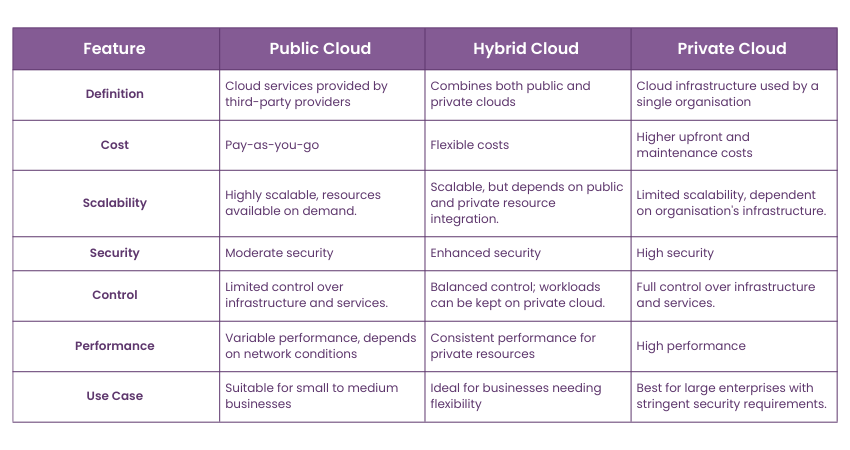
How Does a Private Cloud Work?
A Private Cloud is a single-tenant environment, indicating that all resources are accessible to one customer exclusively, ensuring isolated access. Private Clouds are usually hosted on-site in the customer's data centre. Still, they can also be hosted on a third-party cloud provider's infrastructure or built on rented resources in an offsite data centre. The management approach can also vary, with the customer choosing to handle all aspects themselves or outsourcing part or all the management to a service provider.
Private Cloud Architecture
Despite its single-tenant design, the Private Cloud leverages the same underlying technologies as other cloud services. The ability to rapidly configure virtual servers and computing resources on demand allows customers to quickly scale their infrastructure in response to spikes in usage and traffic. The Private Cloud allows high availability through redundancy and optimises resource utilisation for increased efficiency.
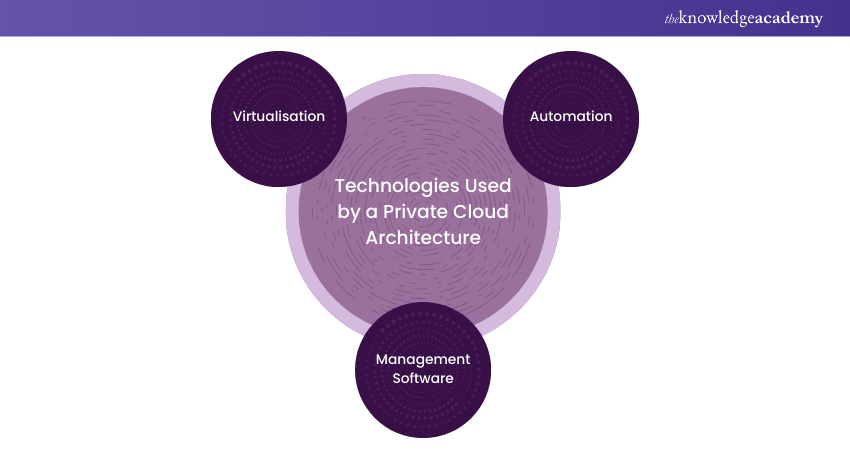
1) Virtualisation: This means that IT resources are no longer restricted to a particular physical hardware and, therefore, can be pooled together to create a vast computing, storage, memory, and networking resource. This pool can be divided among virtual machines, containers, or other virtualised IT infrastructure elements.Virtualisation removes hardware's limitations, allowing it to be shared effectively across various users and applications while enabling maximum utilisation of hardware. This results in the cloud's scalability, agility, and elasticity, allowing organisations to manage their IT resources more efficiently and effectively.
2) Management Software: This allows administrators to efficiently manage and monitor their infrastructure and applications from a centralised location. This provides the ability to enhance security measures, thereby ensuring high availability of resources and optimising resource utilisation within the Private Cloud environment.
3) Automation: This is a decisive tool that can significantly accelerate tasks such as server provisioning and integrations, which would otherwise require repetitive manual effort. Automation facilitates self-service resource delivery by minimising the need for human intervention, which allows users a more efficient and streamlined experience. Automation will enable businesses to optimise their operations and achieve greater productivity and cost savings.
Private Cloud users have the flexibility to embrace and adopt cloud-native application architectures and practices like DevOps, containers, and microservices. This can enhance their operational efficiency and leverage greater flexibility, which can help them easily transition to a public cloud or hybrid cloud.
Ensure more efficient Cloud infrastructure development with our Terraform Course - Sign up now!
Benefits of Private Cloud
Due to the advent of Private Cloud, enterprises can now enjoy the advantages of Cloud Computing without compromising security, control, and customisation. The Private Cloud offers the following benefits:
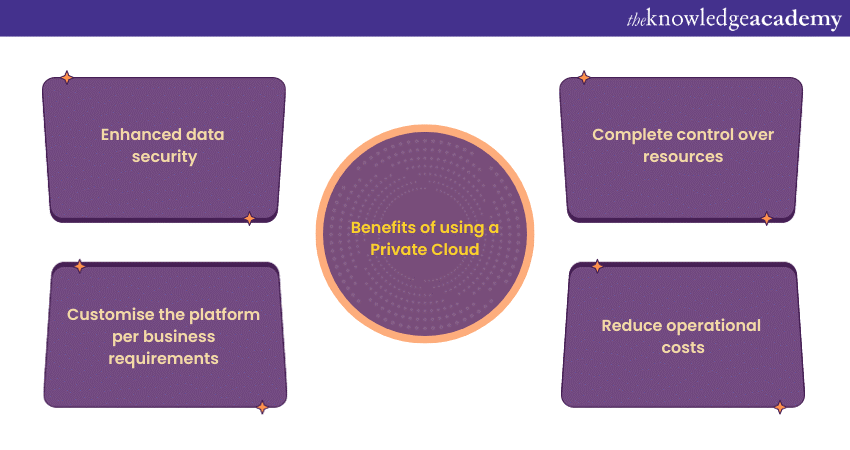
1) Customisation: A Private Cloud allows you to provision and customise infrastructure based on your business and technology requirements.
2) Greater Control: Private Cloud Computing Platforms provide greater visibility and more control over your data and infrastructure because they are hosted in private environments on-premises or in a third-party data centre.
3) Enhanced Security: Private Clouds operate in dedicated, isolated environments which limit access to a single organisation through secure and private networks rather than the public internet.
4) Increased Compliance: Private Cloud can be freely deployed to align with access control or retention policies. Private Cloud infrastructure gives you control over where computing occurs or where your data is stored.
5) Consistent Performance: Performance is more predictable in Private Cloud environments because the hardware isn’t shared with other organisations.
6) Application Modernisation: Many organisations opt to use private cloud environments to modernise legacy applications. You can customise Private Clouds to match individual applications, making it easier to transition workloads to the cloud.
What are the Types of Private Cloud Solutions?
There are three main types of Private Cloud solutions that depend on how they are deployed, as described below:
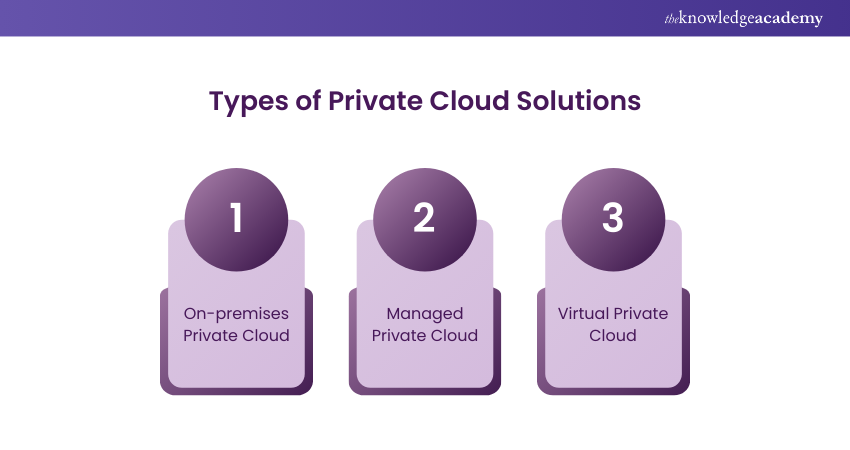
1) On-premises Private Cloud: An on-premises private cloud is deployed on your internal data centre resources. You are responsible for purchasing, maintaining, and upgrading these resources. This solution is expensive, as it requires significant initial investment and ongoing costs.
2) Managed Private Cloud: A managed Private Cloud is a single-tenant environment fully managed by a third party. This third-party organisation purchases and maintains your IT infrastructure in its data centre, providing maintenance, upgrades and remote management. Although managed Private Clouds are costly, they offer greater convenience than on-premises solutions.
3) Virtual Private Cloud: A Virtual Private Cloud is deployed within a Public Cloud infrastructure and offers a secure, isolated environment. Users can host websites, run code, store data, and perform other tasks that require a traditional data centre. Virtual Private Clouds provide the convenience and scalability of Public Cloud resources with additional control and security.
Conclusion
Private Cloud solutions provide businesses with enhanced control, security, and customisation compared to Public Cloud solutions. They ensure data privacy and compliance, making them ideal for organisations with strict regulatory requirements. We hope this blog enlightens you on the importance of the Private cloud and catalyses your organisation to a competitive advantage in the digital market space.
Unlock the potential of Cloud Computing. Explore our Microservices Architecture Training and stay ahead of the curve.
Frequently Asked Questions
What is the Best Example of a Private Cloud?

Two prominent examples of Private Clouds include OpenStack, Amazon VPC, AWS and IBM. They use technologies like virtualisation, Management Software, and automation.
Why is Private Cloud More Secure?

A Private Cloud offers greater security because the resources belong to a single organisation and are not shared among others. It allows organisations to have maximum control over access and data.
What are the Other Resources and Offers Provided by The Knowledge Academy?

The Knowledge Academy takes global learning to new heights, offering over 3,000 online courses across 490+ locations in 190+ countries. This expansive reach ensures accessibility and convenience for learners worldwide.
Alongside our diverse Online Course Catalogue, encompassing 19 major categories, we go the extra mile by providing a plethora of free educational Online Resources like News updates, Blogs, videos, webinars, and interview questions. Tailoring learning experiences further, professionals can maximise value with customisable Course Bundles of TKA.
What is The Knowledge Pass, and How Does it Work?

The Knowledge Academy’s Knowledge Pass, a prepaid voucher, adds another layer of flexibility, allowing course bookings over a 12-month period. Join us on a journey where education knows no bounds.
What are the Related Courses and Blogs Provided by The Knowledge Academy?

The Knowledge Academy offers various Cloud Computing Courses, including the Linux OpenStack Administration Course and the Terraform Course. These courses cater to different skill levels, providing comprehensive insights into Cloud Computing Platforms.
Our Cloud Computing Blogs cover a range of topics related to Cloud Technology, offering valuable resources, best practices, and industry insights. Whether you are a beginner or looking to advance your Cloud Computing skills, The Knowledge Academy's diverse courses and informative blogs have got you covered.
Upcoming Cloud Computing Resources Batches & Dates
Date
 Cloud Computing Training
Cloud Computing Training
Thu 6th Mar 2025
Thu 22nd May 2025
Thu 24th Jul 2025
Thu 4th Sep 2025
Thu 11th Dec 2025






 Top Rated Course
Top Rated Course



 If you wish to make any changes to your course, please
If you wish to make any changes to your course, please


